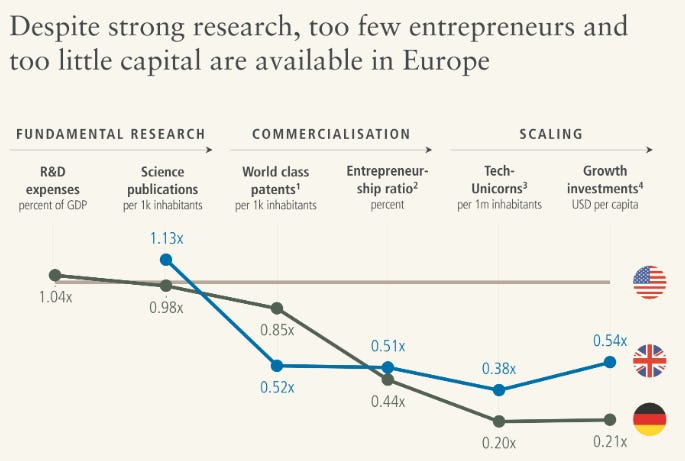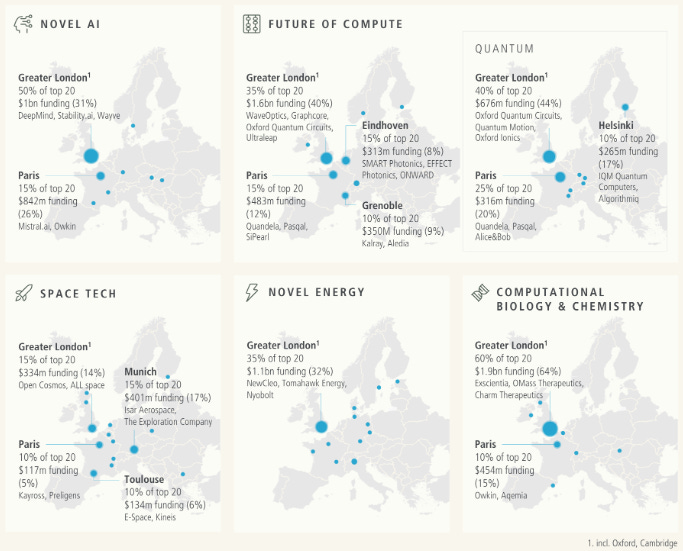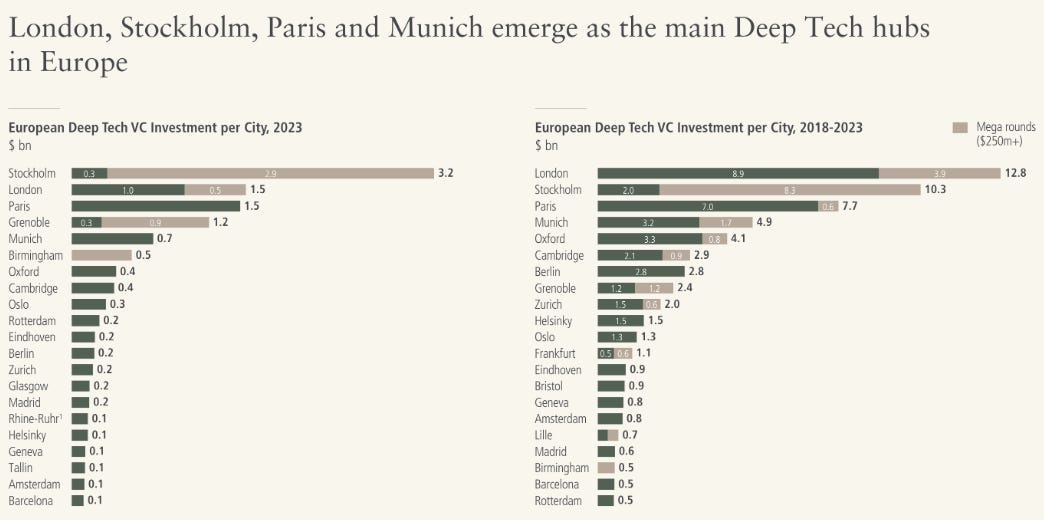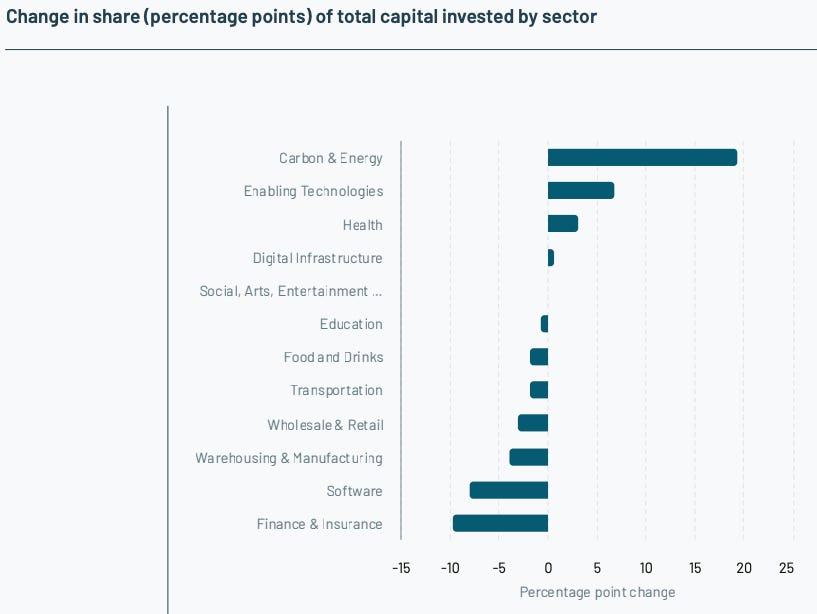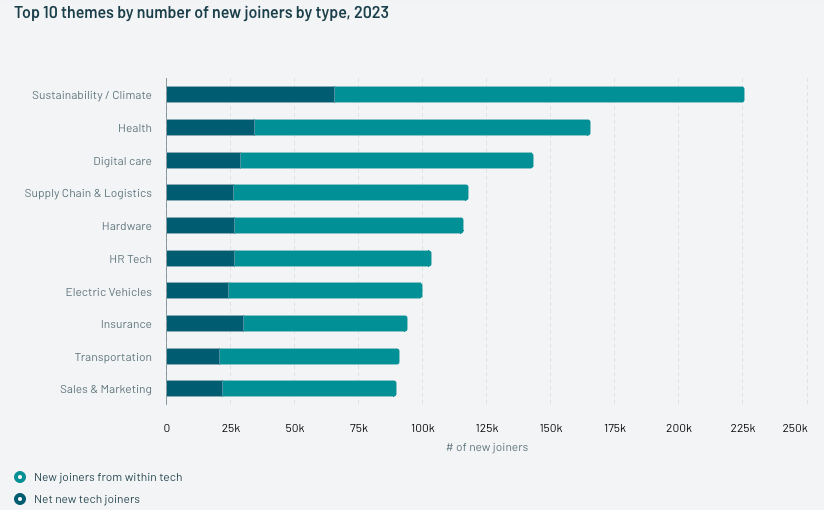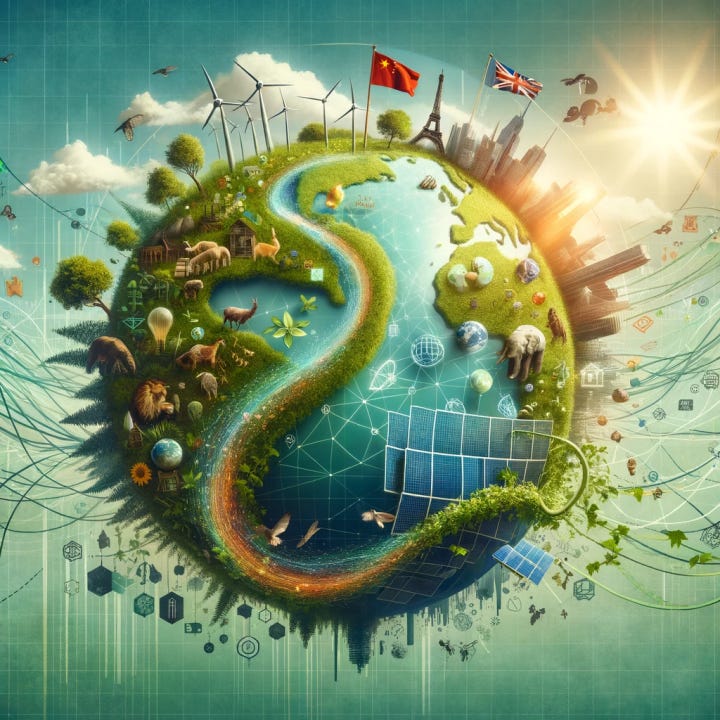RTN: how DeepMind became an underdog
+ in-depth 2023 reports on European DeepTech, COP28 goes Nuclear
🇫🇮 I’m writing this on my flight back from another amazing Slush conference in Helsinki - 👋 was great to see so many of you.
Why DeepMind became the underdog and why it will win.
DeepMind this week announced GNoME, a graph neural net used to discover 380,000 new materials. The company is releasing some of the most groundbreaking research in AI, with large real-world use cases, yet they have been written off by many in the tech ecosystem.
OpenAI celebrated its first anniversary this week, the company has been at the centre of this latest wave of AI progress. Board-level controversies aside, OpenAI’s ChatGPT is the largest-scale consumer application of AI. They have crossed the chasm, allowing non-tech natives to use this, magic-seeming technology simplistically. Asking a technology to generate a poem, a new game format or to create a novel recipe, is new and exciting, an experience that is easy to explain to your grandparents.
The narrative mirage
DeepMind is viewed by many within tech as a historical artefact, synonymous with a prior wave of AI progress. Acquired by a legacy incumbent, that is over-staffed and rarely ships new products. This view has been compounded by the narrative that “Google’s search business is going to be killed by OpenAI”. Why search for keyword listings, when you can prompt a system for the answer?
AI at the Physical Frontier
DeepMind has recently released GraphCast (improved weather prediction), robotics transformers (improved robotic generalisation), RoboCat (self-improving robotic agent), AlphaFold (protein folding) and fusion energy simulation. This research is truly pushing the frontier of science with AI, whilst tackling problems of significance. The wider Alphabet organisation is also concentrated on many real-world products, from Waymo (self-driving) to Intrinsic, their platform for industrial robotics.
Notable, is that many of DeepMind’s breakthroughs are open-sourced, versus closed-source for rival AI labs. DeepMind is a science company, and it’s likely prioritising research, talent acquisition and some of the spillover effects of this research across the Alphabet group. The complexity of the problems DeepMind are solving may not be getting attention, but they’re well-positioned to lead real-world applications of AI.
Top Stories
Anduril releases jet that combats drones (Bloomberg)
People are realizing that the Arsenal of Democracy is gone (Noahpinion)
Alphabet's Dream of an 'Everyday Robot' Is Just Out of Reach (Wired)
War has spread to a 6th domain, the private sector (Financial Times)
Michigan just installed roads that charge your EV as you drive over them (Electrek)
COP28: Countries Launch Declaration to Triple Nuclear Energy Capacity by 2050
The Complex Calculus of Clean Energy and Zero Emissions (Spectrum IEEE)
Everything that happened in Hypersonics in 2023 (Aerospace Americ
Podcast: Disruptive Innovation in Europe, with Frank Thelen;
Research reports on European Tech and DeepTech
This week, Atomico released their annual ‘State of European Tech’ and Lakestar released their ‘European DeepTech Report’, I went through all 374 pages and the highlights are (excuse the image quality):
London, Oxford, Cambridge triangle continues to dominate in terms of DeepTech investment
What sectors is tech talent going to?
🦾 Manufacturing and Robotics
Meta has released Ego-Exo4D, to help advance robotics. Datasets like this will enable robots to gain insight into complex dexterous manipulations by watching skilled human experts in action
Ego-Exo4D is a large multimodal dataset of 1,400+ hours of synchronized first-person "egocentric" video and third-person "exocentric" video capturing skilled human activities like sports, cooking, music, and more.
The dataset has extensive annotations including narrations, play-by-play commentary, expert critiques, eye gaze, head poses, IMU data, point clouds, and more to enable multimodal perception research.
Four benchmark tasks are introduced: ego/exo activity recognition, ego/exo proficiency estimation, relating ego and exo views, and 3D hand/body pose from ego video to drive research progress
🌍 Policy and Geopolitics
Geopolitics Meets Sustainability: The New Frontier for Global Businesses
The ESG agenda overlooks geopolitical vulnerabilities like dependence on authoritarian states for key technologies, industrial capacity and commodities such as rare earth metals, reducing societal resilience
The author proposes a closer integration between sustainability goals and a rapidly evolving geopolitical landscape. With a more sanguine view on public and private sector ability to transition and reliance on external non-sovereign states
As governments address economic security risks, difficult tradeoffs emerge for startups between sustainability goals and business continuity, especially in the tech and defence sectors.





